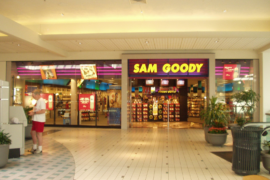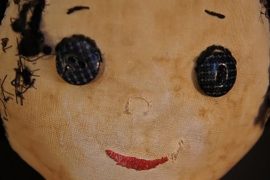Pamela DiFrancesco
This story is like that movie where the two people who were in love break up and decide to erase each other from their minds. It is just like that movie except the end is different. No one tells them what they did, they do not meet again right after, they do not decide to give it another try. Instead they go about their lives, having forgotten each other completely. Then, one day, the man walks into a bakery that the two of them used to shop at. He sees this giant loaf of bread with a crust so dark and thick it is almost like leather. He doesn’t remember that this is a bread he used to pick up when the two of them made dinner, but it looks good, so he buys it. There are little tables in the bakery for sitting at and drinking coffee and maybe eating a cupcake. He sits at one a pulls a piece off the bread. It is hard to pull apart, with the crust so thick and formidable, but he does, and the crumb of the bread is soft like cumulus clouds that tear apart into cirrus clouds. He bites into the bread, but he does not remember, so he does not understand why he starts to cry. He sits there crying, with the people who work at the bakery staring at him, ripping piece after piece of bread off and stuffing it into his mouth. When he can’t eat any more, he stands up and walks out, leaving the rest of the loaf on the table. The whole incident is so strange that he tells his therapist later that week. She asks, “Did your mother ever bake bread?” The answer is yes, and they talk about that for a while. The mystery seems solved.
I guess that wouldn’t make a happy ending. But I like that kind of bread, almost as much as I like semolina with sesame seeds. I am also fond of olives, purple-black kalamatas and plump green Sicilian ones, and ones stuffed with garlic, ones that are hard and meaty and ones that squish as if they are giving up when you take the slightest bite from them. And cheeses: soft brie with its textured rind, stinky bleu cheese, harder cheeses that are smoked, anything tangy and made from the milk of goats, sharp provolone. I like them all piled together in cheese stores, in dim rooms where the air is thick with their smell and there are great wheels of every kind of cheese and silver scales and clever cashiers and no vegans to be found. I like to lay out these crusty breads and tart olives and smelly cheeses on a plate together, with maybe a strawberry or two, or some slices of Granny Smith apple. And perhaps a little cruet of honey for the brie.
I guess this story doesn’t make sense if you haven’t seen the movie. But there was bread and cheese and olives and fruit, so I hope you were at least able to enjoy those.
Pamela DiFrancesco studied writing at New School University. Her fiction has appeared in Cezanne’s Carrot and The Carolina Quarterly.



